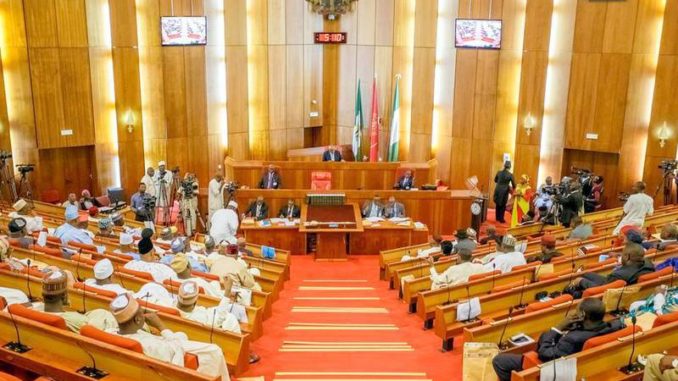
The Nigerian Senate has passed the 2020-2022 Medium Term Expenditure Framework and Fiscal Strategy Paper (MTEF/FSP) submitted by President Muhammadu Buhari and jacked the 2020 budget to N10.729.4 trillion.
The passage on Thursday was as a result of the presentation and consideration of the report of the Senator Solomon Adeola-led Senate Committee on Finance by the Red Chamber in Abuja.
The upper chamber increased the proposed nation’s budget for 2020 from N10.002 trillion to N10.729.4 trillion as well as increased the oil benchmark from $55 per barrel to $57 per barrel, representing a $2 increase.
More so, the Red Chamber hiked the 2020 revenue target by the Nigeria Customs Service (NCS) by N557.4 billion, that is, from N942.6 billion to N1.5 trillion, while retaining the exchange rate at N305 per dollar and oil production benchmark at 2.18mbpd as proposed in the MTEF/FSP by the executive.
The Committee also recommended the adoption of N1.5 trillion as the amount for new borrowing by the Federal Government in 2020, as a result of reduction of N200 billion which was sourced from the increase of revenue target of the Nigeria Custom Service.
According to the Nation, the Committee further called for an urgent review and amendment to the Fiscal Responsibility Act (FRA Act) and the various laws of the revenue generating agencies to align with current realities.
This information form part of the recommendations of the National Assembly Joint Committee on Finance report on 2020-2022 MTEF/FSP which was considered by the Senate in Abuja on Thursday.
The committee also recommended the adoption of 2.18mbpd as daily production output in 2020, adding that in view of concerted effort by NNPC and security agencies, the menace of oil theft and vandalization, the 2.18mbpd would be realizable.
The committee recommended that the exchange rate of N305/$ should be maintained for economic stability, while more work should done by the Minister of Finance and all economic advisers and her team on improving the economic growth by increasing the GDP and reducing the inflation rate to single digit.
It said that the saving on income accruing from the increase of the benchmark amounting to N172 billion, which represented the Federal government potion of the $2 added to the benchmark be used to pay salaries and emolument of the proposed 30,000 new employees.
END

Be the first to comment